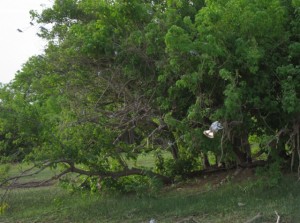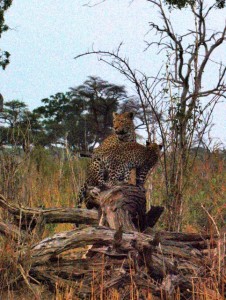The morning glow is faint and “Good Morning” originates from just outside our door. New system. Early morning game drives, afternoon siesta in the heat, and evening game drives. Meals before, between and after. Sleep when appropriate.
No animals passed through the camp last night but the morning bird sounds have make a comeback. Loud, many and 360 degrees. At 5 am when Dunega comes to rouse us, I am mostly awake. Shave, teeth, quick breakfast and the camp is behind us by 6 am.
Less than a km down the road we get a lesson on leopard tracks. He(she) followed the road we are on so we keep our eyes open. We pass through an area that looks as though a tornado has demolished the trees. Elephants use their bulk and strength to push over the trees to better access the tasty morsels at the top. This area is obviously populated with trees the elephants like.
The Savuti Marsh is quiet. For the first two hours the only other vehicle we see is a film crew that probably preceded us in the animal search. It rained the last couple of days so the animals have moved to other places where water collects. Don’t know if it is better water or they want a change of scenery.
We are driving slower today. No destination, just game viewing. The flies are of the same variety as the ones in Tanzania, bothersome and pesky. The lady riding shotgun in the filming truck has a head scarf covering all but her eyes, nose and mouth, foiling the bothersome insects’ attempt to buzz her.
Many birds congregate at one of the water pools that intersects our path. Pat gets excited when he sees a small flock of Pied Kingfishers dive bombing. We spend at least a half hour there trying to photograph one of them pulling a fish from the water. These birds hover, similar to hummingbirds, over the water, spy their prey and drop straight into the water, sometimes rising up with a small fish in the mouth.
Pat’s camera battery dies and all he can hope for is that the once in a lifetime photo op is not imminent. And as luck would have it the word reaches us that a mother leopard and her cub are on the march not far from where we are. Pat hears that this mother should have two cubs, a male and female. The male one is either dead, has ran off or is in hiding. When we arrive, mom is resting in the shade; daughter is exploring the wilds nearby. With patience and some coaxing from the kitten, mom is on her feet and moving again. Four vehicles follow along as she moves parallel to the road.
She angles toward us, everyone present seems to understand she is going to cross the road. The path is right between the vehicles. I hear more camera clicks in one minute than I have heard in any one day over the past 2 weeks. The duo crosses over 2 more roads and there are 4 vehicles waiting for her at each crossing. Debbie has been videoing a couple of the animals in Tanzania and gets some footage of this absolutely beautiful animal as she ambles within inches of our truck.
Lunch is being served back at camp so that is our next stop. The tents are set very close to the Savuti Channel which in 2010, after 26 dry years, flooded. It remains with water even in this dry season. Not more than 100M from our tent wallows a hippo. It is bellowing and snorting very loudly explaining to all near that this is my corner of the channel and keep your grubby paws out of my bath water.
The tourist season in Botswana is about to break, ending at the end of November and starting again around the first of February. We are one of maybe 10 tours plying the area at this time. Debbie and I are the only two on our nine person tour. Boy this is uncrowded even after an ‘uncrowded’ Serengeti. The animals are fewer or at least hidden, but we sit and watch the animals we come upon for a long time, and drink it in as they go about their business of survival.
We spend a large amount of time watching the young animals and their parents as the young are taught the lessons of life. This afternoon Pat spots a family of yellow mongoose, whose abode is located within a meter of the side of the road, out of the burrows and romping around in their yard. The young ones are wrestling with each other and messing with their parents. The adults are busy digging in the soil hunting bugs for supper. Every so often the kids stop their fooling around and dig just as their parents are doing. Hopefully they are finding enough bugs to supply them with calories to play.
We move down the road and Pat says “eyes up”; there is an owl on the ground and it looks like it is trying to lift its prey. When we arrive we realize that it is a mother and her owlet. The mom is trying to show said kid how to flap its wings and fly. The kid obviously made it to the ground but the idea of getting back to the nest is a somewhat harder concept to grasp. Mom suddenly flies up to the lowest branch on the big tree. She sits and waits for her offspring to figure out how to fly. Mom makes not a peep, just looking around presumably scouting potential danger, while owlet screeches ‘help’ from the ground. We watch for quite a while and the only movement from the kid is to duck low to the ground whenever another vehicle passes. It’s time to move on and the owlet has not made it to the branch. We wish it good luck and continue down the road. Our return trip takes us by the tree where this life drama is taking place. The mother is still in the tree waiting and the child is nowhere to be seen. We assume that it has made its way into the adjacent bush for protection from the spirits of the night. (As a post script; we drove by the next morning and the owlet is on the branch where mama was and both the mother and the father have disappeared, presumably to find food after a long night of child rearing.)
(Murray’s take on what Debbie mentioned yesterday with one more days insight on the subject) As we drove up to the campsite yesterday I saw an elephant lying on the ground. Pat says it is not lying down, it is dead. Both Debbie and I gawk at it as we pass. Not more than 50M beyond there is another dead elephant. Pat tells us that both these have just recently died because he was here two day ago and they were not on the ground at that time. He goes on to explain there are many elephants dying in Chobe National Park this year. Chobe is known for the great numbers of elephants that live here. Over the past year several herds have moved to Chobe in search of food and water. That has increased the stress on an already stressed environment. To add insult to injury the rains are late and the food supply is completely exhausted. As a result nature is taking its course and through natural selection the elephant population is being thinned out. Even with this knowledge it does not make it easier to pass the many, many elephant carcases lying motionless on the side of the track. Our hearts sag each time we see one. It is a cruel end for such giant majestic beasts.
Early to rise means early to bed and we hit the sack at about 9pm. What do you mean we are getting old?


